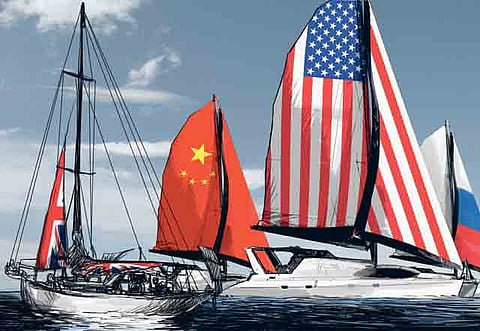UK faces multiple challenges
Britain's recent election brought several issues to a head and highlighted the country's diminished role in the world

Not since the Second World War has the United Kingdom found itself wrestling with such a heavy load of intractable problems — political, constitutional, economic, military and geostrategic.
The general election of May 6 — in which no single party won an absolute majority — has brought all these problems into focus, to the anguish of the entire political class. Lamenting the fact that he was denied the clear victory he thought in his grasp, Prime Minister David Cameron had earlier spoken of a "broken political system".
The wild card is Nick Clegg's Liberal Democratic Party. The Lib Dems won 23 per cent of the votes cast but only 57 seats in the House of Commons — less than a tenth of the total — demonstrating the flagrant unfairness of the present ‘first-past-the post' system.
This is the reason the Lib Dems have campaigned for decades for an electoral system of proportional representation. The party is now in a position to demand this radical change, or at least to insist on a referendum on the question. One way or another, the two-party system, which has for so long dominated British politics, is all but dead. Bring on coalition politics!
Proportional representation is not the only change the Lib Dems insist upon. They want ties with Europe closer than either the Conservative Party or Labour is ready for. They are more tolerant of ethnic and sexual minorities than these two parties. They want less slavish dependence on the United States.
Overshadowing these policy differences is Britain's acute financial crisis. The huge budget deficit is close to £170 billion (Dh929.6 billion) in 2010-2011 — about 11 per cent of national income. If Britain is not to suffer the humiliating experience of Greece, which had to go cap in hand to its European partners and to the International Monetary Fund, it must make savage cuts in government spending. Social security and public sector pay will be among the first victims.
This means fewer benefits for the old, the sick and the unemployed, fewer government employees, fewer teachers in schools and fewer nurses in hospitals. It means deferring major infrastructural projects until another day, and it also means higher taxes. Britain is no longer rich. It must tighten its belt, not just for a few months but for several years to come.
Can this be done without social upheaval, without strikes, without class warfare, without skirmishes in the street? This is the grim outlook Britain shares with Spain, Portugal, Ireland and France, as well, of course, with Greece, where the crisis has created a near-revolutionary situation.
Perhaps the biggest shock to the British public is that the financial crisis has brought home that Britain is no longer a great power. Although the decline has been evident for decades, it was somehow overlooked by much of the population. Power has been moving away from Britain since the exhausting and bankrupting ordeal of the Second World War, and the process of decolonisation that inevitably followed. This month's election made the picture clearer, because it was a moment to take stock.
Not only is Britain outdone in Europe by Germany, but it is overshadowed by China, India, Russia, Brazil, and, of course, by the United States, which is now beginning to show a healthier rate of growth of about 3.5 per cent and considerable job creation. Britain, still in the doldrums, must now adapt to a more modest place in a rapidly changing world.
Foolish war
The Iraq war was a watershed. It was a catastrophic imperial enterprise that, under pressure from the pro-Israeli neocons, the US embarked upon, and which Britain was foolish enough to join.
The Lib Dems want Britain to find an early exit from Afghanistan, another doomed imperial venture. Killing Muslims in Afghanistan and Pakistan only feeds Muslim rage and must inevitably import South Asian tensions into Britain and America — a point demonstrated by the recent case of Faisal Shahzad, the young Pakistani-American who tried to blow up a car in New York's Times Square.
Britain will have to make urgent military cuts. Aircraft carriers, nuclear submarines, fast jets — all will have to be scaled back. And Britain's already small army will have to be trimmed still further. The question of whether Britain can afford an independent nuclear deterrent will need to be debated. This is just one of the geopolitical consequences of the crisis.
Britain's new government will soon have to tackle this great array of problems. What will make the task still more difficult is that no one party is strong enough to impose its views on parliament and the country.
A way out of the crisis would be for Europe to overcome its petty nationalisms and unite to form a stronger continent, able to match the wealth and power of the United States, China and other emerging nations. But the British, for all their strengths and weaknesses, are still too insular for such a radical solution.
Patrick Seale is a commentator and author of several books on Middle East affairs.
Sign up for the Daily Briefing
Get the latest news and updates straight to your inbox


